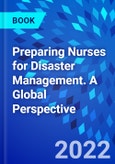Learn how to plan for and respond to disasters! Preparing Nurses for Disaster Management: A Global Perspective helps you build the skills you need to prepare for, respond to, and recover from emergency situations efficiently and effectively. It includes the personal stories of nurses who have experienced disasters, describing the specific incident, the response, what worked or didn't work, and the lessons learned. Case studies show how to apply international response guidelines in providing care for those in need. Written by Joanne Langan, an internationally known expert in disaster preparedness, this reference will help you feel more confident in handling the aftermath of both natural and man-made disasters.
- Coverage of disaster management includes the stages of disaster response, nursing roles, and personal case studies of actual disasters and public health emergencies around the world, e.g., natural disasters, global earthquakes, radiation disasters, chemical disasters, biologic or infectious disease outbreaks, and man-made disasters. - Actual Disasters unit provides a description of each event, preparedness, response, recovery, personal preparedness equipment, legal and ethical issues, special considerations, and lessons learned. - Tabletop exercises and drills allow organizations and institutions to assess their readiness, determine community vulnerabilities, and prepare appropriate responses to disaster events such as an active shooter, cyberattacks, and the grid/power going down. - Case studies help you learn to apply concepts to practice. - User-friendly content includes definitions of key terms and the role expectations for different nurse specialties and levels. - Discussions of International Council of Nurses' Core Competencies in Disaster Nursing use this benchmark as an outline for effective nursing practice before, during, and after disasters. - Reviews of psychiatric/mental health issues discuss interventions to improve mental health following disasters. - Expert contributors share perspectives and experience from a number of different countries.
- Coverage of disaster management includes the stages of disaster response, nursing roles, and personal case studies of actual disasters and public health emergencies around the world, e.g., natural disasters, global earthquakes, radiation disasters, chemical disasters, biologic or infectious disease outbreaks, and man-made disasters. - Actual Disasters unit provides a description of each event, preparedness, response, recovery, personal preparedness equipment, legal and ethical issues, special considerations, and lessons learned. - Tabletop exercises and drills allow organizations and institutions to assess their readiness, determine community vulnerabilities, and prepare appropriate responses to disaster events such as an active shooter, cyberattacks, and the grid/power going down. - Case studies help you learn to apply concepts to practice. - User-friendly content includes definitions of key terms and the role expectations for different nurse specialties and levels. - Discussions of International Council of Nurses' Core Competencies in Disaster Nursing use this benchmark as an outline for effective nursing practice before, during, and after disasters. - Reviews of psychiatric/mental health issues discuss interventions to improve mental health following disasters. - Expert contributors share perspectives and experience from a number of different countries.
Table of Contents
Units I Overview of Disaster Preparedness- Natural and Human Made Disasters
Unit II Stages of Disaster Response
2. Disaster Management Agencies and Organizations
3. Preparedness and Mitigation
4. Response (to include triage and decontamination)
5. Recovery (to include victims, health care workers, pysch mental health)
Unit III Roles
6. Role of the General Professional Nurse (to include students, hospitals, clinics, health centers, nurse educators, long term care, volunteers)
7. Role of the Advanced or Specialized Nurse (to include public health, advanced practice, military)
8. Personal Preparedness (family, dependents, pets)
Unit IV Actual Disasters and Public Health Emergencies
Template:
Description-where, when, nationwide, local, state
Preparedness
Response
Recovery
PPE-Personal Preparedness Equipment
Legal
Ethical
Special Considerations
Lessons Learned
9. Natural Disasters (to include Hurricanes Katrina, Sandy, Florence, CA wildfires/earthquake, Joplin Tornado, European Heat Wave 2003, South Australia Blackout 2016-also include global warming discussion)
10. Global Earthquakes (to include Christchurch New Zealand, Nepal Earthquake, Indian Ocean and Tsunami 2004 (Banda Ache), Haiti Earthquake 2010
11. Radiation Disasters (to include Chernobyl, Fukishima Daichii Japan 2011)
12. Chemical Disasters (to include Bhopal Gas Disaster 1984)
13. Biologic or Infectious Disease Outbreaks (SARS, MERS, ZIKA, Ebola)
14. Human Made Disasters (include bombings, ie Las Vegas, Oklahoma, Boston Marathon, Atlanta Olympics, Active Shooter-Columbine, Newtown, Las Vegs, Parkland)
Unit V Anticipating the Future: Brainstorming Exercises
15. Vulnerability Exercise
16. Tabletop Drills (advantage/disadvantages, comparison of all types of drills
Drills to include active shooter, cybersecurity, grid/power going down
Appendixes:
CDC Information and Toolkits, DHHS---Go kits for populations/different age spans
International Council of Nurses---Core Competencies in Disaster Nursing, version 2.0








